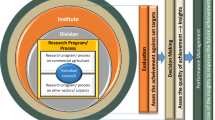Abstract
Application of an efficient management system is a prerequisite for a smooth and efficient running of any activity. Whilst the world is rapidly evolving, the SMART objectives (Specific, Measurable, Achievable, Relevant, Time) become essential for the management of research projects, human resources and personal development. This paper addresses the issue of management in science and discusses the implications of this approach at the micro-level, or the individual activity of the researchers. The following two situations are examined: management of the research process, carried out by the researcher, and management of a team that conducts the research. This study elucidates the strategy development of organization and monitoring of both the scientific and statistical results. The SMART management can take the strain off the project manager by enabling of permanent monitoring and gathering information for managerial reviews and external audits. It is proposed to design the science management system aligned to the financer’s policies and recommendations (government, foundations, business, etc.). Each research project has three key aspects: results, knowledge and impact, which are presented for the case of a scientific community within the Republic of Moldova. It should be noted that especially in the former Soviet countries, where the scientific communities are small and underfunded, the role of competition in research is exalted, and therefore, cooperation, strengthening and clustering of the research community becomes more important. Since the research management at the policy level has been pedaled over the competition, many fields and scientific schools, unfortunately, have been lost. The case study for the national research project RedoxPro implementation is given.
Access this chapter
Tax calculation will be finalised at checkout
Purchases are for personal use only
Similar content being viewed by others
References
Argento, D., Grossi, G., et al.: Governmentality and performance for the smart city. Acco. Auditing Account. J. 33(1), 204–232 (2019)
Bogue, R.: Use SMART goals to launch management by objectives plan (2018)
Dierdorff, E.C., Fisher, D.M., Rubin, R.S.: The power of percipience: consequences of self-awareness in teams on team-level functioning and performance. J. Manage. 45(7), 2891–2919 (2018)
Doran, G.T.: There’s a SMART way to write managements goals and objectives. Manage. Rev. 70(1), 3536 (1981)
Drucker, P.F.: The Practice of Management, 416 p. Harper Business (2006)
Duca, G.: Contribution to Knowledge Society, 280 p. Stiinta, Chisinau (2009)
Duca, G., Petrescu, I.: Managementul academic. Bibl. St. Central Andrei Lupan ASM, Chisinau (2015)
Duca, G., Pop, I.A.: Uniti prin stiinta. Academia Romana, Centrul de studii Transilvane (2018)
Duca, G, Travin, S.: What is effective science management? Part 1&2. In: International Conference on Management Science and Engineering Management (2020)
Duca, G., Belostecinic, G., Petrescu, I.: Managementul timpului: Managementul timpului, tiin omniprezent n viziune academic. Expert (2018)
Duca, G., Belostecinic, G., Petrescu, I.: Managementul timpului: Timpul ca resurs strategic pentru organizaie i om. Expert (2018)
Locke, E.A., Latham, G.P.: Building a practically useful theory of goal setting and task motivation - a 35-year odyssey. Am. Psychol. 57(9), 705–717 (2002)
O’Neil, J., Conzemius, A.: The Power of SMART Goals: Using Goals to Improve Student Learning, 195 p. Copyright by Solution Tree Press, Bloomington (2006)
Phyllips, J.: PMP Project Management Professional Study Guide. McGraw-Hill Education, New York (2018)
Piskurich, G.M.: Rapid Instructional Design: Learning ID Fast and Right, 3rd edn., 560 p. Wiley (2015)
Reynolds, D., Teddlie, C.: The International Handbook of School Effectiveness Research, 428 p. Routledge, London (2000)
Siegert, R.J., Taylor, W.J.: Theoretical aspects of goal-setting and motivation in rehabilitation. Disabil. Rehabil. 26(1), 1–8 (2004)
Yemm, G.: FT Essential Guide to Leading Your Team: How to Set Goals, Measure Performance and Reward Talent, 184 p. Pearson Education Limited, London (2012)
Acknowledgements
The SMART approach reflected in this paper was applied for the management of the research project Nr. 20.80009.5007.27: “Physical-chemical mechanisms of the redox-processes with partial electron transfer in the vital, technological and environmental systems” (RedoxPro).
Author information
Authors and Affiliations
Editor information
Editors and Affiliations
Rights and permissions
Copyright information
© 2021 The Author(s), under exclusive license to Springer Nature Switzerland AG
About this paper
Cite this paper
Duca, G. (2021). Design of the Smart Objectives System in the Management of a Research Project. In: Xu, J., García Márquez, F.P., Ali Hassan, M.H., Duca, G., Hajiyev, A., Altiparmak, F. (eds) Proceedings of the Fifteenth International Conference on Management Science and Engineering Management. ICMSEM 2021. Lecture Notes on Data Engineering and Communications Technologies, vol 79. Springer, Cham. https://doi.org/10.1007/978-3-030-79206-0_34
Download citation
DOI: https://doi.org/10.1007/978-3-030-79206-0_34
Published:
Publisher Name: Springer, Cham
Print ISBN: 978-3-030-79205-3
Online ISBN: 978-3-030-79206-0
eBook Packages: Intelligent Technologies and RoboticsIntelligent Technologies and Robotics (R0)




